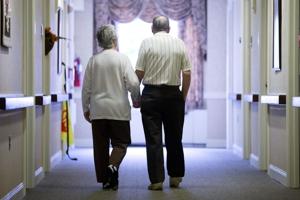Pandemic puts focus on challenges facing Pennsylvania’s nursing care community

(The Center Square) – The nearly 33,000 COVID-19 deaths of residents in Pennsylvania long-term care facilities is drawing more attention to resident care and nursing home regulations.
The biggest issue is staffing, according to testimony at a recent meeting of the Pennsylvania Senate Democratic Policy Committee.
“The issue is that all the health care facilities, whether they are nursing facilities, hospitals or home health care, we are all competing for the same pool of workers,” said Dennis Biondo, the Allegheny County executive director for Kane Community Living Centers. “You can offer more money, and the next nursing home across the street is going to offer a little more to get that same person.”
The work is hard, and many agreed that people who enter the field have a certain calling. Keisha Williams has worked in the field since 2012 and says she is seeing people leave to take other jobs.
“This work has been named the most dangerous job in the country,” Williams told the committee. “And yet on the whole, we are paid poverty wages. We lack affordable health care. Our employers put a ‘Heroes’ sign in front of our buildings yet we were disciplined for speaking out when we were told to reuse gowns and soiled masks.”
There is no single solution to the problem, said Georgia Goodman director of government affairs for LeadingAge PA.
“We need a dynamic and evolving approach,” she said. “We need partnerships with the Department of Education and more institutions that educate to provide exposure to aging service with curriculums that support the introductory needs and knowledge of nursing assistants. These programs should be available using modern technology and offered via flexible online methods.”
Regulation also needs to be addressed, accordion to testimony from the panelists. Regulation has not been about “creating meaningful change,” Biondi said. Oversight is done by surveys from the Pennsylvania Department of Health that Biondi classified as “just a way to check off boxes.”
The lack of regulation is affecting patient care, according to Williams.
“Right now in Pennsylvania, homes are only required to provide each resident with 2.7 hours of care a day,” Williams said. “That’s less than three hours a day to bathe, clothe, feed and care for your loved one. The AARP, federal government, and dozens of scholars and advocates agree the minimum necessary to provide patients with a safe environment and quality care is 4.1 hours per day. Pennsylvania should do no less.”
Funding formulas need to be changed help nursing homes with costs, according to the panelists. Money from the Coronavirus Aid, Relief and Economic Security Act was not distributed in a way that would provide the most help, according to Nick Vizzoca president and CEO of Vincentian.
“Major acute care providers received proportionally more CARES Act funding than smaller organizations like Vincentian because the CARES Act funding was calculated by Medicare beds, not Medicaid beds,” Vizzoca said in his testimony. “During the pandemic, relief was needed most by operators who rely on Medicaid funding. According to a recent RKL Medicaid Funding Shortfall Analysis, the Medical Assistance reimbursement shortfall for nursing home operators in Pennsylvania is a staggering $631 million annually.”
The issues faced by the nursing home industry won’t end with the pandemic, according to Sen. Lindsey Williams, D-Allegheny.
“We need to do more to protect the health, safety, and emotional well-being of our seniors, and hearing directly from the people who are doing this work every day is a key part of creating legislative policy that will provide the supports needed to accomplish those goals,” Williams said.
Disclaimer: This content is distributed by The Center Square

